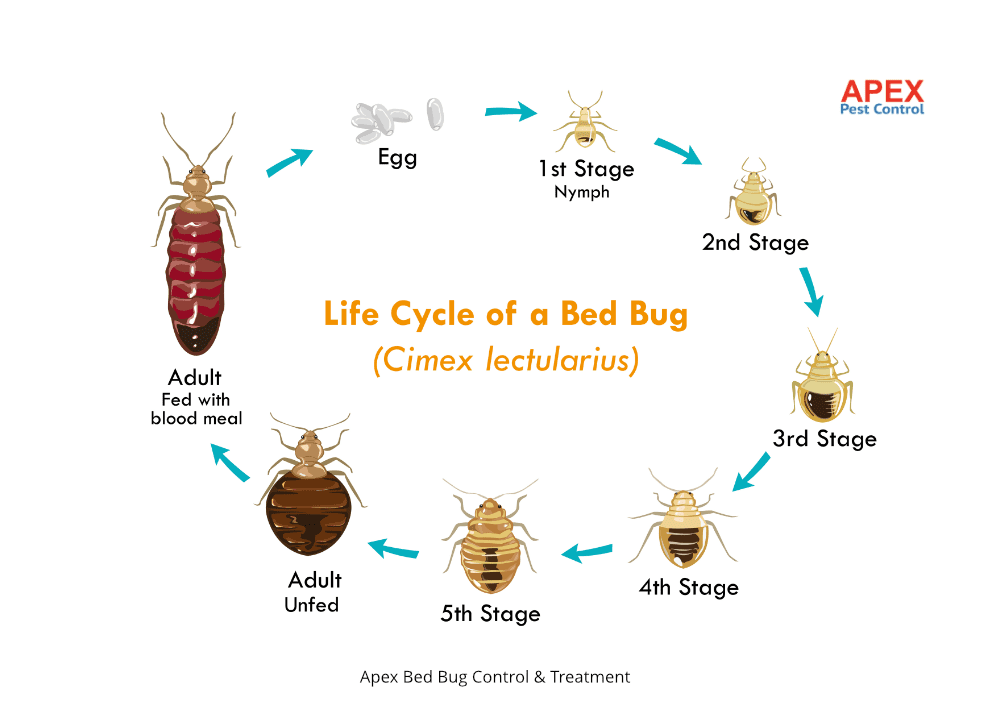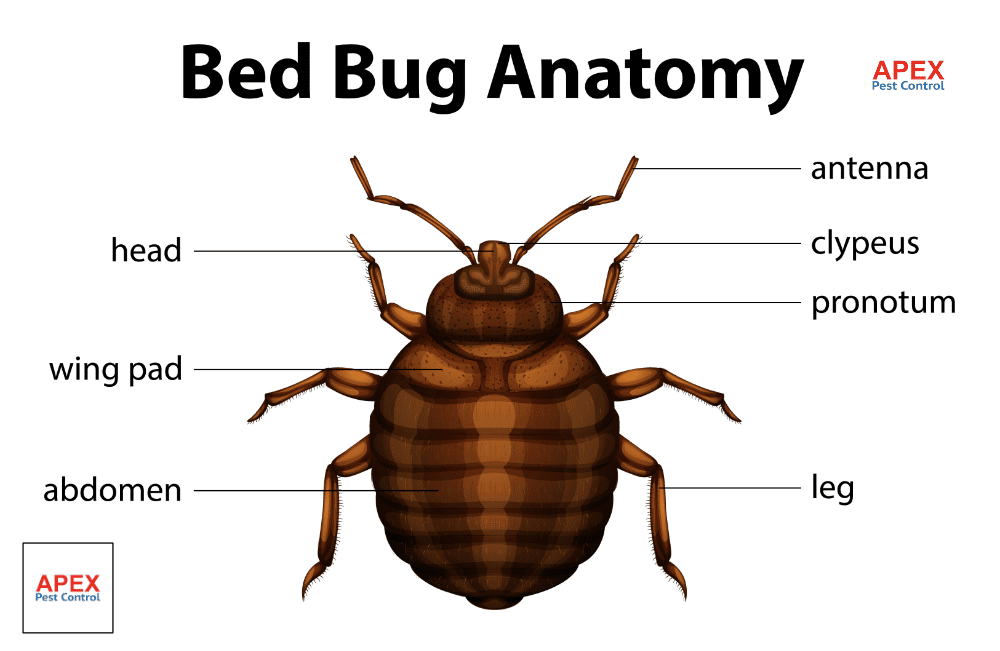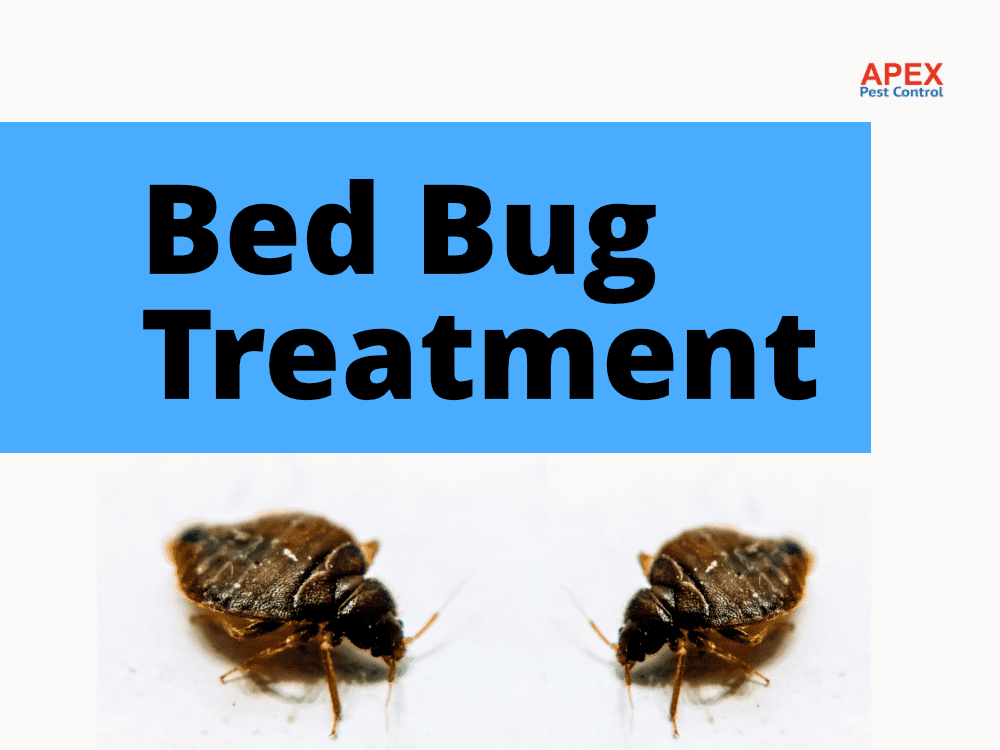Bed bug treatment
Get rid of bed bugs with Apex Pest Control.
Bed bug treatment needs to be done quickly and efficiently. Though they may be small insects, and infestation is unhygienic, unwelcome and unsanitary, sometimes causing nasty health problems.
The unpleasant creatures hide all over your home, but you’ll typically find bed bugs in your bed and bed frame, mattress and furniture, and in and amongst items of clutter.
If you’ve travelled, you might bring bed bugs home with you in your suitcase, picked up from hotel rooms. They’re also often found in second-hand furniture, too. Or, they might be uninvited guests that have found their way into your house and made themselves at home.
Bed bugs quite common, but notoriously hard to get rid of by yourself. People often think an alcohol spray or a good clean will do the job, yet the bugs are usually resistant to insecticides. What’s more, as they’re so small, it can be easy to think you’ve eliminated them all when in fact they’re lingering in cracks and crevices.
Calling in pest control experts, like Apex Pest Control here in Yorkshire, is essential. Our services include the use of sprays ad heat treatment that tackle infested items or problem areas to eliminate bed bugs from your home.
What is a bed bug?
Bed bugs are a tiny insect, around the size of an apple seed. They’re red, brown or dark yellow in colour, an oval shape, and quite flat. Adult bed bugs are usually around 5mm in length.
They live for weeks, sometimes months, feeding on the blood of animals and humans, and can be discovered all-around your home. In their short lives, they typically produce between 400 and 500 eggs: a shocking number that means bed bug spread is rapid, and treatment is vital. They feed at night, so if you’re waking up in the morning with tiny bite marks and itchy skin, you may have an infestation.
Bed bugs get their name from the place you’ll most commonly find them: your bedding. Though you might be surprised to learn that, in fact, bed bugs live in a host of hiding places all-around your home. You’ll find them in your mattress, bed frames and furniture, as well as buried in clothing and clutter in every room in your home.
You might even find they’ve made themselves comfortable behind picture frames, loose wallpaper, or in cracks and crevices like furniture and mattress seams or mattress box springs.
Unfortunately, here’s nowhere they won’t hide and, once they’re there, it’s tough to get rid of an infestation without professional pest control.
Bed bugs are insects from the genus Cimex that feed on human blood, usually at night. Their bites can result in a number of health impacts including skin rashes, psychological effects, and allergic symptoms. Bed bug bites may lead to skin changes ranging from small areas of redness to prominent blisters.
https://en.wikipedia.org/wiki/Bed_bug
How do I know if I have a problem with bed bugs?
You might not release at first that your home has bed bug problems. However, there are some signs you can look out for around your home. Firstly, look for blood spots on your clothing, mattress and bedding.
These are tiny spots that appear when the insects have been crushed, often when you’re asleep at night (so you may notice the marks appearing on your bedsheets). Of course, as well as squashing the blood may be a result of biting.
Secondly, keep an eye out for bed bug excrement. Again, these are tiny marks, but these are dark brown. You’ll be able to identify them as they’ll bleed a little as they run through materials as a marker pen would.
Another way to spot bed bugs is from their eggs. Bed bug eggs and eggshells are only about 1mm at first, but grow larger. Their pale yellow colour can identify the eggs.
Why are bed bug infestations a problem?

Infested areas are not just a nuisance and unpleasant to think about: they’re potentially harmful to your health. At best, a bed bug bite is irritating. Red, itchy marks can appear on your skin, usually on your face or neck, or other areas not covered by clothing while you’re sleeping.
You will probably notice that these appear in a cluster, where the bed bugs have been using you for a blood meal while you’ve been sleeping. It certainly doesn’t sound nice, and the visible signs of infestations are not something you’ll want to show.
For some people, the marks are very itchy and cause painful swelling. This can require treatment, and you might need creams from your pharmacist. Some people may even need to see their GP is the swelling is particularly bad. Though it is rare, a big bed bug infestation in your home and result in anaemia.
Bed bugs also attack domestic animals, from cats and dogs to chickens. This can be incredibly irritating, and the bites hugely uncomfortable for your pets, sometimes causing them pain that also needs medical treatment. (This can be expensive for pet owners too.)
Which treatments kill bed bugs instantly?
Treatment of bed bugs is difficult. (There’s no such thing as an effective homemade bed bug
spray.) You need to make sure you’ve fully removed bed bugs from all their hiding places in an infested room. If you don’t, the adults will continue to multiply and use you as their nightly blood meal: certainly not a pleasant thought.
Alcohol spray is a common at-home treatment method. However, bed bugs are often resistant to non-professional spray methods.
Many people believe homemade heat treatment (putting their clothing, mattress protector or bedding into the washing machine on a high temperature) will do the trick. Others believe a good deep clean and getting out the vacuum cleaner will clean infested areas and remove the insects from your room.
Of course, these are great practices: a cleaned, vacuumed and clutter-free home will help keep the bugs are bay, and let you spot infestations early, they’re not effective treatments. And as bed bugs often live in your mattress and box springs, dust and a hot wash through the machine certainly won’t get rid of them all.
What’s more, a homemade alcohol spray and shop-bought insecticides, even if they say they’re non-toxic, are not things you want to spray over your mattresses, bed frames and soft furnishings, especially indoors.
Can I get rid of bed bugs by myself?
Bed bugs are so tiny: they can really only be accurately identified with a magnifying glass. So it would be best if you had an experienced team who know exactly what they’re looking for. Professional pest control from our expert team here at Apex Pest Control is an easy way to put your mind completely at rest. We find the bed bugs in their hiding places in the cracks and crevices of your home and use our tried and tested heat treatments.
Getting rid of bed bugs with the correct treatment is crucial to eliminate them. To do this, you need a professional approach with bed bug spray that is both safe to use and guaranteed to kill bed bugs (and to make sure they don’t come back!).
To guarantee that bed bugs are completely eliminated, we offer our second treatment at a reduced rate of £100 (it is rare for all bed bugs to be removed at first attempt). Bed bug removal treatment starts at just £165, and we charge only £35 for an extra room that needs attending to.
How does Apex Pest Control eliminate bed bugs?

A bed bug infestation needs to be dealt with thoroughly and with the right treatment. We start with an extensive investigation of your room and everywhere, bed bugs may typically hide. We check your bed, mattress and box spring, mattress seams, bed frame, furniture and all cracks and crevices: any area where bed bugs may hide.
Of course, we’ll also look for any blood on your mattress and furniture, or any bed bug adults who have hidden their eggs away. Bed bugs certainly find a wide variety of problem areas to hide in, so a careful assessment of your room is essential to bed bug control.
Once we’ve identified problem areas, our bed bug treatments always involve applying a suitable and long-lasting residual insecticide to all surfaces. To do this, we use a flat fan and crack and crevice sprayer to all bedrooms, including bed frames, and other rooms where we suspect bed bugs hide and are likely to cause bites.
We follow this with the use of an Ultra Low Volume (ULV) space spray for a quick knockdown effect. In this way, we approach the treatment with a long-term residue and a rapid bed bug control technique.
What bed bug killer treatments will Apex Pest Control use?
There are a number of bed bug removal steps we follow for use on any area of your home where the bugs can be found. Insecticide treatments completed thoroughly and correctly by a pest controller are the best bed bug, controllers.
Up to three different types of insecticides may be used to achieve the best result, and our expert pest control team will choose the ones perfect for your infestation and environment.
There are three main types of bed bug insecticide, which are all far superior to homemade bed bug alcohol sprays:
- A fast-acting, contact insecticide for use on surfaces that people often touch, such as furniture and bed frames.
- A residual insecticide used inside furniture, such as mattress seams, and on the underside of the surfaces, we touch.
- A dust insecticide, for cracks and voids, such as electrical sockets and skirting boards.
Other bed bug control methods, such as heat treatments, steam application, or freezing, may work. Items receiving heat treatment don’t need insecticide spraying as well.
Before the bed bug controller attends, you’ll be given instructions on what to do and how to prepare your room. Make sure these are followed carefully.
An insecticide treatment typically takes around 30 minutes to 2 hours per room, depending on the size of the room, number of bugs, condition and content of the room. Once the procedure is completed, you should wait until all the insecticides have dried before re-entering your room, or until the bug control expert says it is safe to re-enter.
Interesting Facts about BedBugs
Why choose Apex Pest Control?
With 30 years’ pest control experience, we’ve tackled all sorts of unwelcome infestations with effective treatments for domestic and commercial needs across Yorkshire.
Working across Leeds, Sheffield, Rotherham, Doncaster, Barnsley, and beyond, we work 7 days a week to get your pest problems under control as quickly as possible – with no call out charge. And, as we know you need a quick solution to your pest problems, we accept both credit and debit card payments.
Bed bug treatments are a huge part of our services. Yet we offer pest control of all types of unwanted visitors to tackle the unwelcome infestation. This includes rats and mice, wasps and bees, flying insects, ants and cockroaches, and squirrels and birds as well as bugs.
We’re fully insured members of the National Pest Technician Association, giving you complete peace of mind in our treatments, methods and expertise. Our five-star customer reviews on Google back this up. And we’ll always aim to beat local council pest control teams on both service and price, with competitive local rates.
What’s more, we understand you may be a little concerned about the need to bring in a team like Apex Pest Control, especially if you’re a commercial site. It’s a worry for your customers, and bugs can result in big problems with both profits and insurance.
Apex the Specialists to get rid of bedbugs.
If you’re worried about the perception of pest removal teams on your site, our teams and our vans are both completely discreet, so there are no obvious signs that infections were present, and treatment was needed.
Eliminate bed bugs with our tried and tested insecticide spray and heat treatment methods that target all areas of your home. If you think you might have a bed bug infestation, get in touch with Apex Pest Control for a thorough, prompt and cost-effective bedbug control service today. Call 0113 3904270
See our related post: wasp-nest-removal-leeds/
Read More on Your bedbug infestation.
Bedbugs – some of the most unwanted human bed-mates – have been parasitic companions with other species aside from humans for more than 100 million years, walking the earth at the same time as dinosaurs.
Work by an international team of scientists, including the University of Sheffield, compared the DNA of dozens of bedbug species to understand the evolutionary relationships within the group as well as their relationship with humans.
The team discovered that bedbugs are older than bats – a mammal that people had previously believed to be their first host 50-60 million years ago. Bedbugs, in fact, evolved around 50 million years earlier.
Bedbugs rank high among the list of most unwanted human bedfellows, but until now, little was known about when they first originated.
To think that the pests that live in our beds today evolved more than 100 million years ago and were walking the earth side by side with dinosaurs, was a revelation
PROFESSOR MIKE SIVA-JOTHY, UNIVERSITY OF SHEFFIELD’S DEPARTMENT OF ANIMAL AND PLANT SCIENCES
Experts have now discovered that the evolutionary history of bed bugs is far more complex than previously thought and the critters were actually in existence during the time of dinosaurs. More research is needed to find out what their host was at that time, although current understanding suggests it’s unlikely they fed on the blood of dinosaurs. This is because bed bugs and all their relatives feed on animals that have a “home” – such as a bird’s nest, an owl’s burrow, a bat’s roost or a human’s bed – a mode of life that dinosaurs don’t seem to have adopted.
The team spent 15 years collecting samples from wild sites and museums around the world, dodging bats and buffaloes in African caves infected with Ebola and climbing cliffs to collect from bird nests in South East Asia.
Professor Mike Siva-Jothy from the University of Sheffield’s Department of Animal and Plant Sciences, who was part of the team, said: “To think that the pests that live in our beds today evolved more than 100 million years ago and were walking the earth side by side with dinosaurs, was a revelation. It shows that the evolutionary history of bed bugs is far more complex than we previously thought.”
Dr Steffen Roth from the University Museum Bergen in Norway, who led the study, added: “The first big surprise we found was that bedbugs are much older than bats, which everyone assumed to be their first host. It was also unexpected to see that evolutionary older bedbugs were already specialised on a single host type, even though we don’t know what the host was at the time when T. rex walked the earth.”
The study also reveals that a new species of bedbug conquer humans about every half a million years: moreover that when bedbugs changed hosts, they didn’t always become specialised on that new host and maintained the ability to jump back to their original host. This demonstrates that while some bedbugs become specialised, some remain generalists, jumping from host to host.
Source: www.sheffield.ac.uk/news/nr/bedbugs-parasites-evolved-millions-years-dinosaurs-trex-1.843890

Tony Johnson, Founder & Lead Technician at Apex Pest Control, is a BPCA and NPTA accredited pest management expert with over 35 years’ hands-on experience. Tony specialises in Integrated Pest Management and ensures all services comply with UK pest legislation, including the Wildlife and Countryside Act 1981 and COSHH Regulations 2002. His commitment to continual learning and adapting to industry best practices means clients receive effective, safe solutions for pests affecting homes and businesses across South Yorkshire. Tony’s dedication to professional standards, ethical treatment methods, and local expertise has made him a trusted partner for pest control and prevention.
-
BPCA & NPTA accredited | CHAS certified
-
Committed to UK pest law compliance & safety
-
Focused on effective, ethical pest management for South Yorkshire


